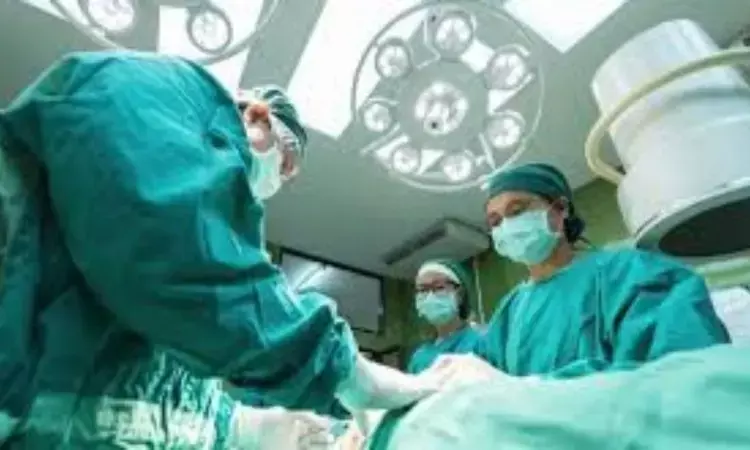- Home
- Medical news & Guidelines
- Anesthesiology
- Cardiology and CTVS
- Critical Care
- Dentistry
- Dermatology
- Diabetes and Endocrinology
- ENT
- Gastroenterology
- Medicine
- Nephrology
- Neurology
- Obstretics-Gynaecology
- Oncology
- Ophthalmology
- Orthopaedics
- Pediatrics-Neonatology
- Psychiatry
- Pulmonology
- Radiology
- Surgery
- Urology
- Laboratory Medicine
- Diet
- Nursing
- Paramedical
- Physiotherapy
- Health news
- Fact Check
- Bone Health Fact Check
- Brain Health Fact Check
- Cancer Related Fact Check
- Child Care Fact Check
- Dental and oral health fact check
- Diabetes and metabolic health fact check
- Diet and Nutrition Fact Check
- Eye and ENT Care Fact Check
- Fitness fact check
- Gut health fact check
- Heart health fact check
- Kidney health fact check
- Medical education fact check
- Men's health fact check
- Respiratory fact check
- Skin and hair care fact check
- Vaccine and Immunization fact check
- Women's health fact check
- AYUSH
- State News
- Andaman and Nicobar Islands
- Andhra Pradesh
- Arunachal Pradesh
- Assam
- Bihar
- Chandigarh
- Chattisgarh
- Dadra and Nagar Haveli
- Daman and Diu
- Delhi
- Goa
- Gujarat
- Haryana
- Himachal Pradesh
- Jammu & Kashmir
- Jharkhand
- Karnataka
- Kerala
- Ladakh
- Lakshadweep
- Madhya Pradesh
- Maharashtra
- Manipur
- Meghalaya
- Mizoram
- Nagaland
- Odisha
- Puducherry
- Punjab
- Rajasthan
- Sikkim
- Tamil Nadu
- Telangana
- Tripura
- Uttar Pradesh
- Uttrakhand
- West Bengal
- Medical Education
- Industry
Indocyanine Green Angiography Enhances Free Flap Surgery Outcomes

In a recent study, a team led by Sunil Choudhary aimed to explore the potential benefits of Indocyanine Green Angiography (ICGA) in free flap surgeries. The findings were published in the Indian Journal of Plastic Surgery.
Free flap surgery, a complex reconstructive procedure involving the transfer of tissue from one part of the body to another, is often used in cases of trauma, cancer, and congenital anomalies. However, flap failure due to insufficient blood supply can be a major concern, leading to partial flap loss and the need for re-exploration, both of which can significantly impact patient recovery and increase healthcare costs.
The study, conducted over a period of 12 years and comprising 877 consecutive free flaps, sought to assess and validate the role of ICGA in improving surgical outcomes and its cost-effectiveness. Additionally, the researchers introduced a new intraoperative protocol known as whole-body surface warming (WBSW) during strategic "microbreaks" to further enhance flap success rates.
The ICGA group, consisting of 438 patients, was compared to the historical No-ICGA group, comprising 439 patients, to evaluate the impact of ICGA on flap-related adverse outcomes. Statistical analysis revealed that the use of ICGA resulted in a significant reduction in partial flap loss and re-exploration rates when compared to the No-ICGA group.
Moreover, the study found that ICGA was a cost-effective tool in free flap surgeries, providing valuable real-time information on flap perfusion and enabling surgeons to make well-informed decisions during the procedure. By identifying potential problem areas early, surgeons could take corrective measures, thus reducing the need for re-exploration and minimizing the associated costs.
Furthermore, the researchers introduced the innovative concept of whole-body surface warming (WBSW) during "microbreaks" in the surgical process. This new protocol was shown to have a positive impact on flap perfusion. By optimizing blood flow to the flap during critical moments, WBSW increased the chances of flap success and further improved patient outcomes.
As a result of these findings, the study strongly recommends the integration of ICGA into the intraoperative assessment of flap perfusion in free flap surgeries.
Reference:
Choudhary, S., Khanna, S., Mantri, R., & Arora, P. (2023). Role of Indocyanine Green Angiography in Free Flap Surgery: A Comparative Outcome Analysis of a Single-Center Large Series of 877 Consecutive Free Flaps. In Indian Journal of Plastic Surgery (Vol. 56, Issue 03, pp. 208–217). Georg Thieme Verlag KG. https://doi.org/10.1055/s-0043-57270
Neuroscience Masters graduate
Jacinthlyn Sylvia, a Neuroscience Master's graduate from Chennai has worked extensively in deciphering the neurobiology of cognition and motor control in aging. She also has spread-out exposure to Neurosurgery from her Bachelor’s. She is currently involved in active Neuro-Oncology research. She is an upcoming neuroscientist with a fiery passion for writing. Her news cover at Medical Dialogues feature recent discoveries and updates from the healthcare and biomedical research fields. She can be reached at editorial@medicaldialogues.in
Dr Kamal Kant Kohli-MBBS, DTCD- a chest specialist with more than 30 years of practice and a flair for writing clinical articles, Dr Kamal Kant Kohli joined Medical Dialogues as a Chief Editor of Medical News. Besides writing articles, as an editor, he proofreads and verifies all the medical content published on Medical Dialogues including those coming from journals, studies,medical conferences,guidelines etc. Email: drkohli@medicaldialogues.in. Contact no. 011-43720751


